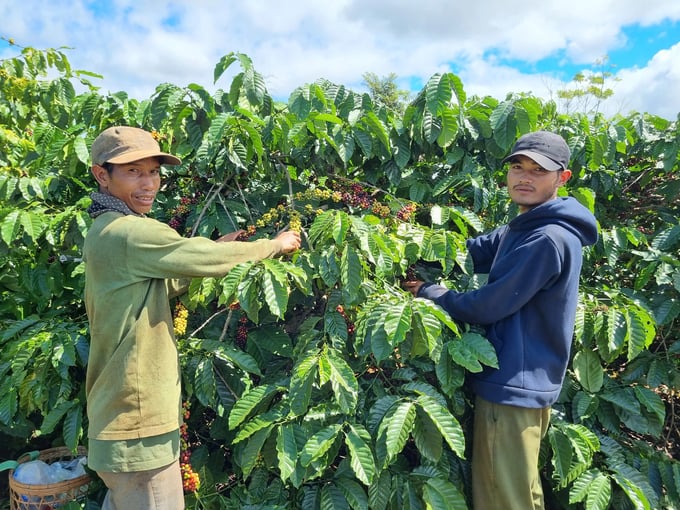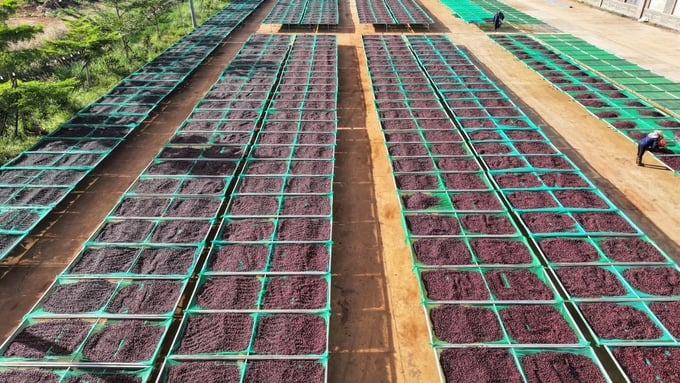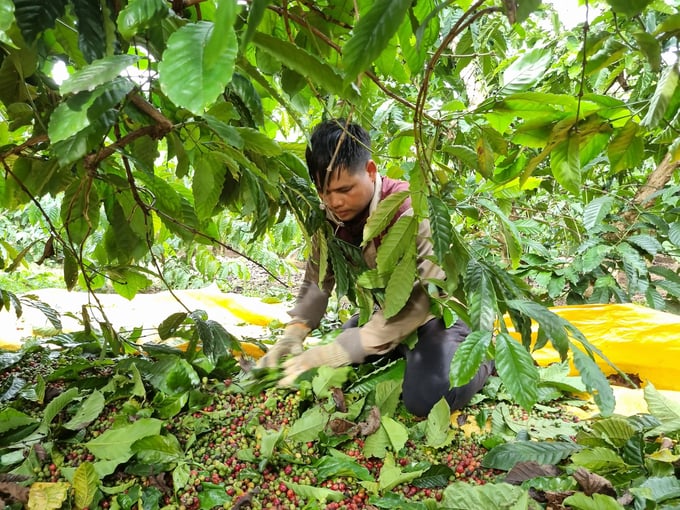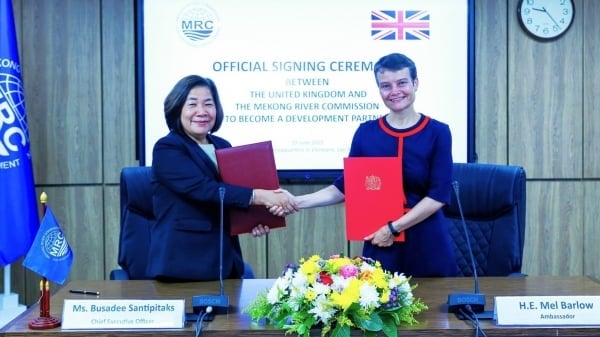June 21, 2025 | 12:47 GMT +7
June 21, 2025 | 12:47 GMT +7
Hotline: 0913.378.918
June 21, 2025 | 12:47 GMT +7
Hotline: 0913.378.918

Gia Lai coffee holds high value in the international market. Photo: Tuan Anh.
On November 4, the Department of Industry and Trade of Gia Lai province held a seminar on managing coffee price risks and trading methods on commodity exchanges.
Vietnam is currently the world’s second-largest coffee producer after Brazil, playing a vital role in the global coffee supply. The Central Highlands region, including Gia Lai, is a key coffee production area in terms of acreage, yield, and value.
According to the General Department of Customs, in the first half of this year, Vietnam exported 1 million tons of coffee, generating nearly USD 2.4 billion, a 3.1% decrease in volume but a 2.3% increase in value compared to the same period last year. This also marks the highest export value recorded for the coffee industry in the first half of any year.
Ms. Dao Thi Thu Nguyet, Deputy Director of the Gia Lai Department of Industry and Trade, stated that under the province’s agricultural restructuring plan for 2021-2025, Gia Lai will maintain its coffee-growing area at a stable 98,000-100,000 hectares without expanding.
In recent years, alongside promoting clean coffee production to enhance quality and export value, many businesses in the province have focused on building sustainable coffee production and processing networks, as well as producing some specialty coffee to penetrate potential markets.
However, the coffee market is also highly volatile, with frequent price fluctuations. This presents challenges for businesses within the coffee supply chain.
Thus, it is essential for companies, producers, processors, and exporters to recognize the importance of commodity trading in managing coffee price risks, which can improve business efficiency.

Deep-processed coffee is increasingly accepted by the global market. Photo: Tuan Anh.
Mr. Tran Van Binh, Director of Saigon Invest Commodity Exchange Joint Stock Company, noted that Gia Lai and other Central Highlands provinces have extensive coffee-growing areas, fertile soil, and suitable climates. Establishing a coffee exchange could fully exploit these advantages, contributing to agricultural economic growth. Additionally, the exchange could become a tourism attraction, showcasing local coffee culture and production processes.
"Opening a coffee exchange in Gia Lai presents a significant opportunity to develop the coffee industry, improve local livelihoods, and contribute to socio-economic development. It could also connect with coffee-growing areas in provinces such as Dak Lak, Dak Nong, and Kon Tum", Mr. Binh shared.
Experts indicate that while establishing a coffee exchange in Vietnam is highly promising, certain risks must be thoroughly considered by businesses and the public before investing. Specifically, the legal framework for the commodity market is not yet clear, which could pose challenges for businesses in their operations. In terms of the market, if the exchange fails to attract sufficient participants, it could face liquidity issues, complicating trade execution.
In particular, building and operating a coffee exchange requires a significant initial investment, including expenses for system construction, marketing, and personnel. Without effective risk management, the exchange could face a high risk of loss.
Assessing the feasibility of establishing a commodity exchange, Mr. Nguyen Huynh Phu Lam, Director of Classic Gia Lai Coffee Joint Stock Company, stated that it is essential to consider the benefits it brings to the people, businesses, and local government revenue.

Gia Lai coffee is in the harvest time, promising substantial economic returns for locals. Photo: Tuan Anh.
"Previously, the coffee exchange in Dak Lak didn’t meet expectations. Therefore, businesses want to honestly address issues behind the failure of other exchanges, so we can develop an ideal model for local people and businesses", Mr. Lam shared.
Mr. Lam also pointed out that, as a commodity exchange, it must attract a wide range of participants, including farmers, cooperatives, and businesses. The exchange must clearly demonstrate the benefits for buyers and sellers.
Mr. Tran Van Binh emphasized that the exchange requires thorough preparation, including investment in storage facilities, transportation systems, and quality inspection laboratories. A well-trained staff specializing in trade, management, and marketing is also essential.
However, for the exchange to succeed, investment and effort from government, businesses, and local communities are needed.
“Establishing and operating a coffee exchange in Vietnam demands substantial capital, management experience, and government support. The Vietnamese government has policies in place to encourage and facilitate this activity, helping to grow the domestic coffee market and enhance the value of national agricultural products”, Mr. Binh shared.
Mr. Bui Nguyen Anh Tuan, Deputy Director of the Domestic Market Department (Ministry of Industry and Trade), noted that to bring coffee products to the commodity exchange, the priority must be on product standards and quality, thereby increasing the value of Vietnam’s agricultural products.
However, to organize and operate a commodity exchange effectively, collaboration across sectors such as logistics, finance, and warehousing is crucial, creating jobs and contributing to local economic growth.
Translated by Kieu Chi
![Turning wind and rain into action: [11] Ten years before storms, after every harvest](https://t.ex-cdn.com/nongnghiepmoitruong.vn/608w/files/news/2025/06/20/z6704423696987_15fd32ffc26d590d204d520c9dac6786-nongnghiep-140922.jpg)
(VAN) With WeatherPlus, every raindrop and every breeze carries a message. And if we learn to listen, the fields will no longer live in fear of the weather.
![Turning wind and rain into action: [10] Advancing accessible climate services for farmers](https://t.ex-cdn.com/nongnghiepmoitruong.vn/608w/files/linhnhp/2025/06/20/1911-z6704423696987_15fd32ffc26d590d204d520c9dac6786-nongnghiep-161854.jpg)
(VAN) Not only does it help farmers 'avoid droughts and rains,' the development of agricultural climate services also enhances their ability to proactively adapt to a rapidly changing climate.

(VAN) With international assistance, the harvesting of sargassum seaweed in Quang Ngai has become increasingly regulated, thereby safeguarding marine life and ensuring the stability of coastal communities' livelihoods.

(VAN) On June 19, the United Kingdom officially became a Development Partner of the Mekong River Commission.

(VAN) Biodiversity is being threatened by traditional remedies made from wildlife. Traditional medicine and humans must change to live in harmony with nature.

(VAN) Agrifood investment and finance solutions for people and the planet.

(VAN) Microplastic contamination has become pervasive in seafood, posing unprecedented challenges for food safety and marine ecosystems.